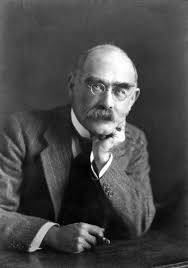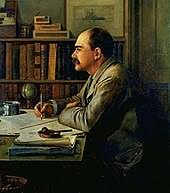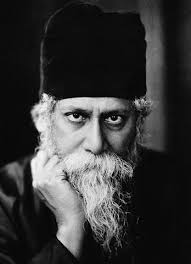 Rabindranath Tagore and Rudyard Kipling never met each other but their admirers often hailed them together in the newsstand. Both are contemporary Indians. Tagore (1861-1941) and Rudyard Kipling (1865-1936). Tagore is considered the father of modern Indian literature. Like Tagore, Kipling too is an Indian, but of Caucasian stock, whose life ran parallel with that of Tagore. While Kipling was among the Anglo-Indian population who administered the British Empire in India, Tagore was a native Indian who resented the colonial presence. He wasn’t overtly political in his activities, but he wasn’t afraid to expose his feelings, either.
Rabindranath Tagore and Rudyard Kipling never met each other but their admirers often hailed them together in the newsstand. Both are contemporary Indians. Tagore (1861-1941) and Rudyard Kipling (1865-1936). Tagore is considered the father of modern Indian literature. Like Tagore, Kipling too is an Indian, but of Caucasian stock, whose life ran parallel with that of Tagore. While Kipling was among the Anglo-Indian population who administered the British Empire in India, Tagore was a native Indian who resented the colonial presence. He wasn’t overtly political in his activities, but he wasn’t afraid to expose his feelings, either.
Kipling of ‘The Jungle Book’ fame wrote many short stories and poems focusing on the Indian subcontinent which inevitably have a similar feel to Tagore. It would be fair to say that both writers shared a similar gift for their tireless work and both were awarded the Nobel Prize for Literature; Kipling in 1907 and Tagore in 1913. Tagore was a polymath and an all-round creative talent. He became a celebrity in the West during the second half of his lifetime. In 1878 Tagore moved to England intending to obtain a degree but he was ill-suited to formal education and returned to India in 1880, having failed in his academic ambitions.
 Kipling was sometimes seen as a racist and had a particular dislike for Bengalis, of which Tagore was one. As a result, there was no love lost between the two literary giants. Tagore had interactions with other European writers, but he ignored Kipling as if he were a pariah. Kipling would not acknowledge Tagore’s work as having any literary worth, because his prejudice was so strong. He insinuated that Tagore was a pretentious pseudo-intellectual, incapable of writing anything of value. Kipling’s view was typically imperialist due to his upbringing. He had been conditioned to believe that “good” Indians were those who knew their place as servants to the ruling elite. His racism towards Tagore was intensified by his resentment that a native Indian had achieved the same literary stature as himself. Kipling needed to feel superior to mask his insecurities, so Tagore’s success presented a psychological impasse.
Kipling was sometimes seen as a racist and had a particular dislike for Bengalis, of which Tagore was one. As a result, there was no love lost between the two literary giants. Tagore had interactions with other European writers, but he ignored Kipling as if he were a pariah. Kipling would not acknowledge Tagore’s work as having any literary worth, because his prejudice was so strong. He insinuated that Tagore was a pretentious pseudo-intellectual, incapable of writing anything of value. Kipling’s view was typically imperialist due to his upbringing. He had been conditioned to believe that “good” Indians were those who knew their place as servants to the ruling elite. His racism towards Tagore was intensified by his resentment that a native Indian had achieved the same literary stature as himself. Kipling needed to feel superior to mask his insecurities, so Tagore’s success presented a psychological impasse.
 Both writers offered an overlap in literary approach and content, as if they were mirrors reflecting the same influences, but with a slightly different perspective. In many ways, Tagore appeared wiser than Kipling, for he was drawn to writing his poetry from an early age and was far more open-minded and accommodating of contrasting cultural influences. Kipling deployed writing as a form of escapism, to hide and express his emotions, having suffered a rather unfortunate childhood as described in his short story ‘Baa Baa, Black Sheep’. Tagore intellectualised the human condition and essentially put himself within the characters so that they were imbued with empathy and sympathy. This was because of his vast ancestral estates where he would travel to collect rents and interact with the tenants. This exposed him to traditional storytelling and songs, as well as philosophical and religious ideas. Tagore wrote while travelling. For example, while he was in Ghazipur—U.P., he wrote most of the poems published in his book Manasi. Kipling could not do this so his characters are more stereotyped and lack the complexity and diverseness observed in real people.
Both writers offered an overlap in literary approach and content, as if they were mirrors reflecting the same influences, but with a slightly different perspective. In many ways, Tagore appeared wiser than Kipling, for he was drawn to writing his poetry from an early age and was far more open-minded and accommodating of contrasting cultural influences. Kipling deployed writing as a form of escapism, to hide and express his emotions, having suffered a rather unfortunate childhood as described in his short story ‘Baa Baa, Black Sheep’. Tagore intellectualised the human condition and essentially put himself within the characters so that they were imbued with empathy and sympathy. This was because of his vast ancestral estates where he would travel to collect rents and interact with the tenants. This exposed him to traditional storytelling and songs, as well as philosophical and religious ideas. Tagore wrote while travelling. For example, while he was in Ghazipur—U.P., he wrote most of the poems published in his book Manasi. Kipling could not do this so his characters are more stereotyped and lack the complexity and diverseness observed in real people.
 Tagore the ‘Bard of Bengal’, and Kipling the ‘Bard of the Empire’, were contemporary literature giants. They were poles apart in thoughts and ideals, viewing society and the Empire from opposite ends of the spectrum. Kipling was strongly nationalistic, while Tagore was a humanist and against the idea of nationalism and the British Empire, though, ironically, Tagore’s poems are today national anthems of two nations, India and Bangladesh. While Kipling was from an educated middle-class family, they were not moneyed, and gaining financial security was important for them. Kipling’s father Lockwood’s decision to come to India as a teacher in the JJ School of Arts was driven by financial need. Tagore on the other hand was born wealthy, in a family of enormous influence and privilege in Calcutta. Despite his privileged background, he had a strong empathy for fellow human beings, which is largely why he was able to write stories and poems with humility and connection.
Tagore the ‘Bard of Bengal’, and Kipling the ‘Bard of the Empire’, were contemporary literature giants. They were poles apart in thoughts and ideals, viewing society and the Empire from opposite ends of the spectrum. Kipling was strongly nationalistic, while Tagore was a humanist and against the idea of nationalism and the British Empire, though, ironically, Tagore’s poems are today national anthems of two nations, India and Bangladesh. While Kipling was from an educated middle-class family, they were not moneyed, and gaining financial security was important for them. Kipling’s father Lockwood’s decision to come to India as a teacher in the JJ School of Arts was driven by financial need. Tagore on the other hand was born wealthy, in a family of enormous influence and privilege in Calcutta. Despite his privileged background, he had a strong empathy for fellow human beings, which is largely why he was able to write stories and poems with humility and connection.
Tagore’s stories are typically a hybrid between fairy-tale ghost effects and fables. They convey the traditional Indian belief system. Many are short in length and are over-descriptive so it won’t be possible to condense them further and some do not have a conclusive ending.
In the year 1913, Tagore became the first non-European to win the Nobel Prize in Literature as a result he remains one of the most important voices of Bengali culture. On the other hand, Kipling was the first English-language writer to receive the Nobel Prize in Literature, and at 41, its youngest recipient to date. He was also sounded out for the British Poet Laureateship and several times for a knighthood, but he declined both. It is not possible to list the extensive work of these two writers in this short piece, but it appears writers of the following generation drew inspiration from them. For example, one can sense a fleeting similarity between Satyajit Ray’s short story ‘Anath Babu’s Terror’ and Tagore’s ‘The Hungry Stones’; and Kipling’s poem ‘Mandalay’, can, as if, mesh with the pages of George Orwell’s book ‘Burmese Days’. Not surprising, to see the connection in literature.
– Kamlesh Tripathi



